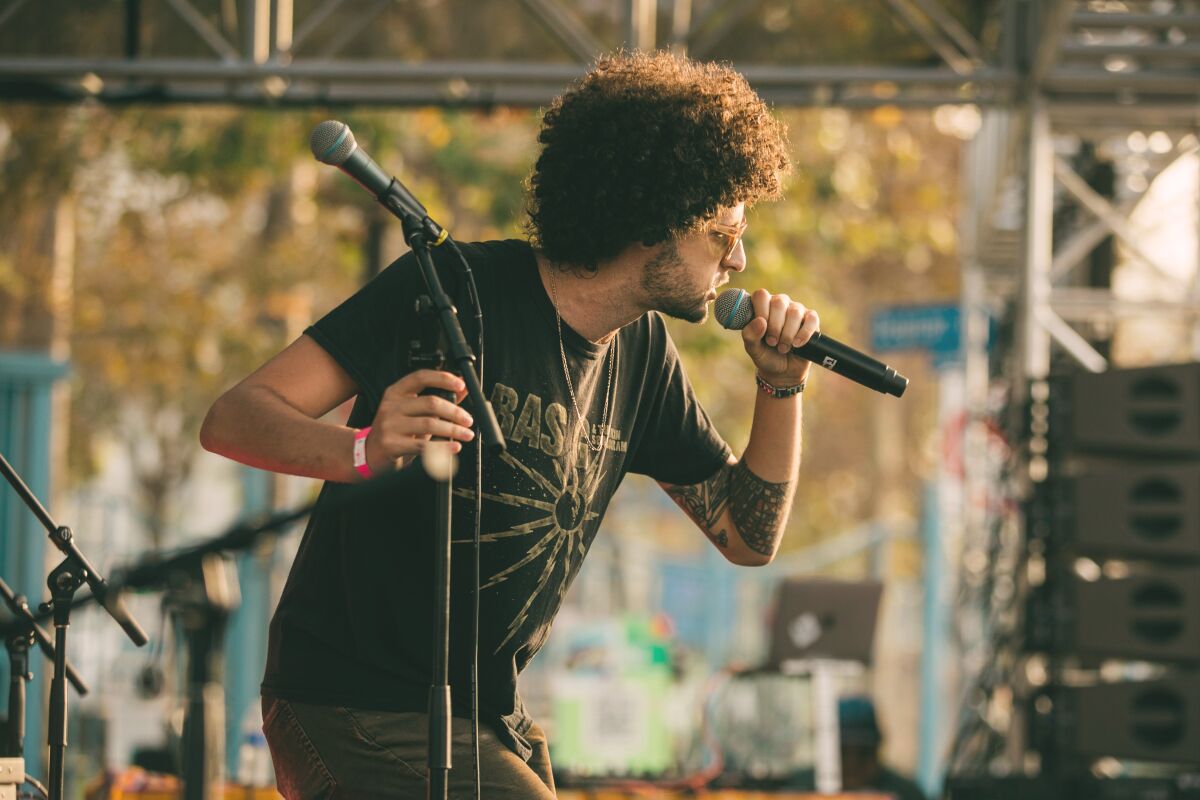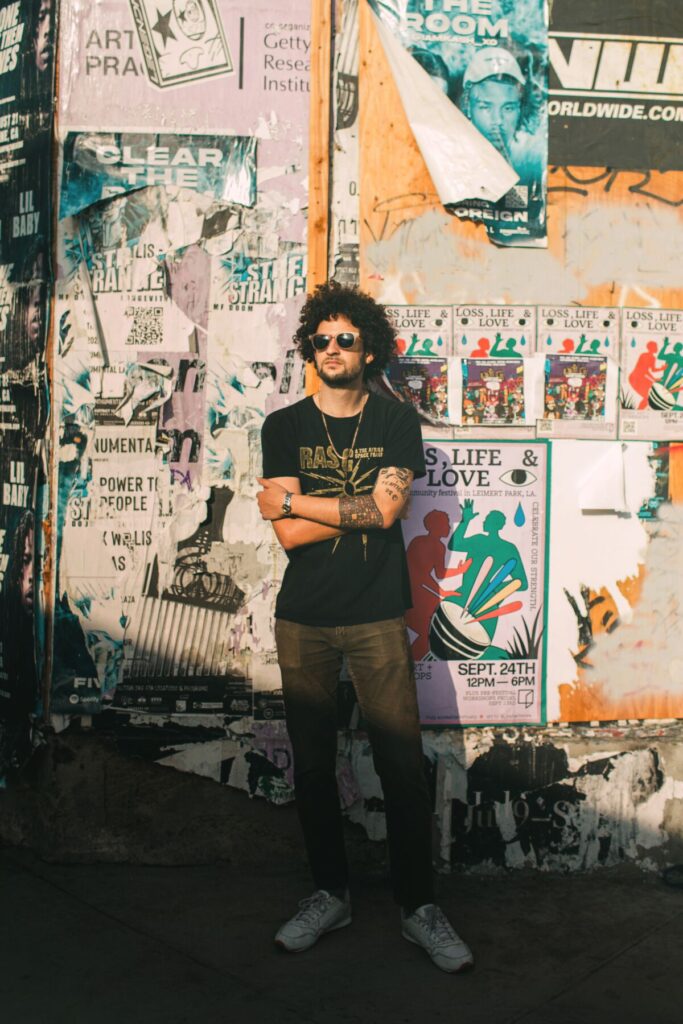In early October, the Los Angeles Metro finally unveiled the polarizing Crenshaw/LAX line, bringing communities from Leimert Park to Westchester into the city’s transit system while simultaneously stoking fears of gentrification and new development in these parts of the city.
Metro rung in the new line with a celebration at Leimert Park Plaza, where a curly-haired rapper named Rhys Langston manned the stage to rap songs from his eclectic catalog. Although Metro had booked Langston, 29, as a solo performer, he made it a group affair highlighting the Leimert Park hip-hop scene, inviting rapper VerBS, host of long-standing hip-hop showcase Bananas, along with emcees All City Jimmy and Alph tha Alien.
“[I had stopped] expecting to be involved in a lot of formal matters in Leimert Park and just decided to embrace the community and represent as best as I can,” Langston said about getting the chance to perform. “But it feels good. Especially the fact that I’m doing a bit of curation.”
“I’m interested to see what [the Metro line] is really going to do because the area has been changing even without it being open,” he added. “But it would serve me well since I live nearby. It’s a new era for L.A. … I don’t know what it’s gonna bring.”
About a mile from the plaza where he took the stage, Langston’s home doubles as a multidisciplinary art dojo. Half-finished oil paintings greet you as soon as you walk through the back door, and if you round the corner into his home studio, you’ll find an array of instruments scattered about the room, obscuring the booklets of original, mixed-media work tucked neatly into a corner.
The home is exactly what you’d expect from perusing Langston’s discography. Although he raps under his birth name, pseudonyms such as “Jesus of Los Feliz” are much more arresting, perhaps only outdone by protracted song titles such as “h— on my d— ‘cuz I look like a drawing of the Prophet Muhammad.”
Over dense production, he raps with a wry sense of humor, racing through each verse with punk rock acceleration. You’d be forgiven if it takes you a dozen listens to parse through a single track.
On his most recent album, “Grapefruit Radio,” he achieves more by doing less, passing off production duties to instead focus on just the lyrics. On “Afro-Eccentric Character Creation Screen,” there’s a shoutout to legendary Living Colour guitarist Vernon Reid, juxtaposed with an eerily specific reference to Tayshaun Prince, the basketball player who played at Dominguez High School in Compton before eventually winning an NBA championship with the Detroit Pistons.
But the album itself was only the gateway into Langston’s world. The project was accompanied by an 85-page “Operator’s Manual,” which features his full-color paintings, song lyrics disguised as “diagnostic sheets” and historical lore of “Grapefruit Radio’s” origins within “The Domain of Langstónia.”
“There’s the famous quote about Clement Greenberg, where he says, ‘All profoundly original art looks ugly at first,’” said Jeff Weiss, an L.A.-based music journalist who signed Langston to his label, POW Recordings. “Rhys’ art might not look ugly — I think there’s a beauty to it — but it may look unorthodox to people who don’t know any better. But I think when all is said and done, people will understand the intent and the broader idea of what he’s doing.”
Langston released his latest album, “Grapefruit Radio,” on Sept. 14.
(Jason Armond / Los Angeles Times)
Langston spent his younger years in Silver Lake but also lived in Hollywood, West L.A. and eventually Leimert Park with his mother after his parents separated. His parents, both of whom had established acting careers, instilled a love for all art forms into their child, enrolling Langston in everything from ballet to art lessons to his middle school orchestra.
Perhaps most pertinently, his parents enriched his vocabulary early on, casually dropping unconventional words in conversation with him around the house, prompting him to seek their definitions. But he credits just as much of his interest in words to video games — specifically the text-laden, story-driven role-player games from the late 2000s.
“I’d notice these gaudy-ass, luxurious words that would be in there,” he said. “It made it a given that I could explore words, and it gave me the fascination early. But part of it was I just wanted to sound smart for a long time.”
Exploring his own identity was an ever-evolving journey spanning much of his adolescence. The son of a Black mother and Jewish father, that self-awareness didn’t truly crystallize until high school, when he was recruited to play basketball at Pacific Hills School, a wealthier private school that closed in 2018.
“Sometimes I had to accept the absurdity of a lot of it at once,” he said. “To experience anti-Blackness not as a Black-white binary sometimes, but coming from people who were the same skin tone as me, or people who are not Black but were darker than the Black people I knew. It gave me a lens where I can look at things with a distance.”

“I had to accept the absurdity of a lot of it,” Langston said of experiencing anti-Blackness as a Black and Jewish teen.
(Jason Armond / Los Angeles Times)
That concept has threaded together much of his music — most overtly on his 2017 album, “Aggressively Ethnically Ambiguous,” but also in dryly comedic lyrics, such as when he calls himself a “Black identity trapeze artist, balanced with bagels, capers” on “Obscenely Poetic,” from “Grapefruit Radio.” In the past, Langston admits he’s had a chip on his shoulder about the struggle of growing a fan base as a local, indie rapper. But these days, he says validation comes from being understood by his musical peers, along with listeners already tapped in to artists who “freak the form.”
But there’s also a desire to push beyond the people already tuned in to his wavelength.
“I do also have a lofty ambition of redefining what we think about as accessible,” he said. “With a lot of genres, the lyrics don’t have to make sense. You don’t have to get every lyric. But with rap, people immediately discount stuff they don’t get at first.”
“Obviously rap serves a different kind of purpose,” Langston added. “But I think there’s a bit of hostility toward not saying everything at once in rap music. It’s a slippery slope, but I want to be in the conversation.”

